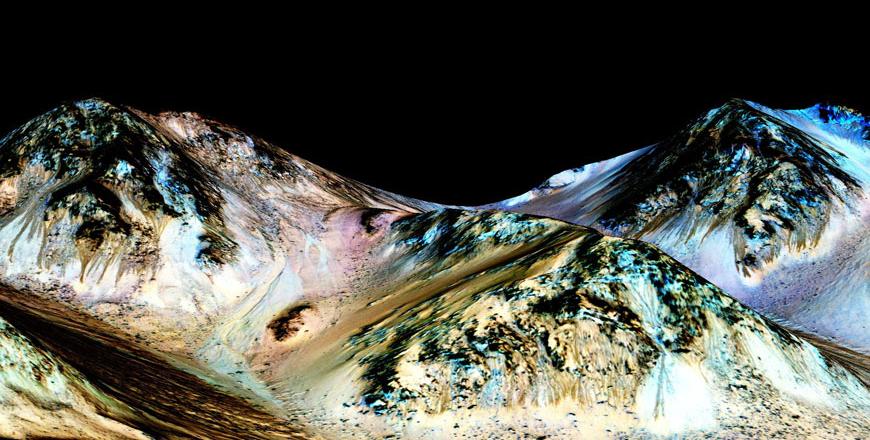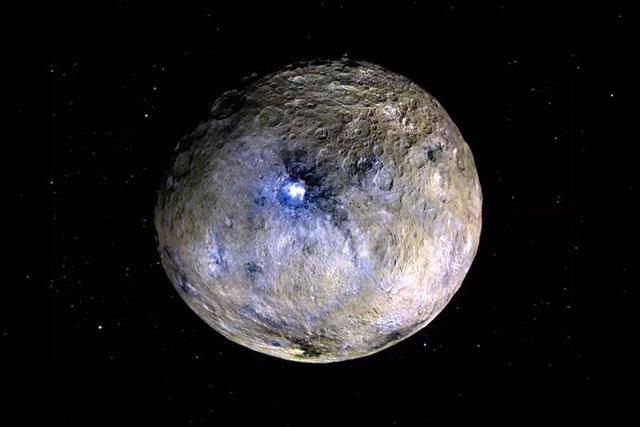You are here
‘Strongest evidence yet’ of liquid water on Mars — NASA
By AFP - Sep 28,2015 - Last updated at Sep 28,2015

A handout image made available by NASA on Sunday shows dark, narrow, 100-metre long streaks called recurring slope lineae flowing downhill on Mars, inferred to have been formed by contemporary flowing water (AFP photo/Nasa/Jpl/University of Arizona)
PARIS — Scientists announced Monday "the strongest evidence yet" of liquid water on Mars, raising a distant prospect of microscopic life on our neighbouring planet.
Curious lines running down steep slopes on the surface of the Red Planet may be streaks of super-salty brine, a team said after discovering evidence of "hydrated" salt minerals.
These results "strongly support the hypothesis" of liquid water on Mars — though not H2O as we know it, concluded a research paper in the journal Nature Geoscience.
If anything, it was likely "wet soil, not free water sitting on the surface", study co-author Alfred McEwen, from the University of Arizona, told AFP.
NASA said the findings, made with its Mars Reconnaissance Orbiter, "provide the strongest evidence yet that liquid water flows intermittently on present-day Mars".
"Mars is not the dry, arid planet we thought of in the past," according to Jim Green, the American agency's planetary science director.
"Under certain circumstances, liquid water has been found on Mars," he told journalists in Washington.
The hydrated salt minerals, called perchlorites, contain water molecules in their makeup, and their presence indicates that "water plays a vital role in the formation of these streaks", according to Lujendra Ojha of the Georgia Institute of Technology in Atlanta.
It is widely accepted that the Red Planet once hosted plentiful water in liquid form, and still has water today, albeit frozen in ice underground.
Earlier this year, NASA said almost half of Mars' northern hemisphere had once been an ocean, reaching depths greater than 1.6 kilometres.
Anybody out there?
Astrobiologist Lewis Dartnell of the University of Leicester Space Research Centre said the study, which he did not take part in, presented "very strong evidence that what we believe to be signs of liquid water trickling down the Martian surface is in fact that”.
This, in turn, raised the intriguing prospect of life, he told AFP.
"If there is liquid water trickling beneath the surface, maybe that's an environment where bacteria and microbial life can survive... The results we've had this afternoon are very exciting because they increase the possibility that there is life alive on Mars today."
Scientists have long hypothesised that the seasonal features, dubbed "recurring slope lineae" (RSL), may be formed by brine flows.
But spacecraft images have been unable to reveal detail of what exactly is in the lines — the pixel resolution is coarser than the width of the streaks themselves.
Up to a few hundred metres in length and typically under five metres wide, they appear on slopes during warm seasons, lengthen, then fade as they cool.
For the new study, a team from the United States and France devised a method to extract more data from individual pixels in images from the CRISM spectrometer instrument on NASA's Orbiter.
They found details "consistent with the presence of hydrated salt minerals that precipitate from water", according to a Nature press release. Precipitation is the process of separating a solid material from a liquid solution.
"The findings strongly suggest a link between the transient streaks on Martian slopes and the flow of liquid brines," it added.
This was not the first time perchlorites were found on Mars.
In April this year, a different team wrote in the same journal that perchlorate salts were "widespread" on the surface of our neighbouring planet, and humidity and temperature conditions were just right for salty brines to exist.
Perchlorate is highly absorbent and lowers the freezing point of water so that it remains liquid at colder temperatures.
Asked if the data was the final proof of liquid water on Mars, McEwen replied: "I would say almost."
Related Articles
Gullies on Mars that appeared to have possibly been carved by water were probably dug out by great chunks of dry ice, a pair of French
PARIS — The dwarf planet Ceres — long believed to be a barren space rock — is an ocean world with reservoirs of seawater beneath its surface
A comet the size of a small mountain and about as solid as a pile of talcum powder whizzed past Mars on Sunday, dazzling space enthusiasts with the once-in-a-million-years encounter.

















